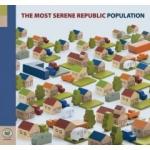
The Most Serene Republic Population
(Arts & Crafts)
In an interview I had with The Most Serene Republic's Emma Ditchburn, she noted the inspiration behind Population. Much like the cheery, wooden, cookie-cutter town presented on the cover, the band went back home and found a town transformed from a small and homely to bustling, crowded streets, from small shops to big corporations. Everyone is happy and everyone is content; but the band, thrown off by this change in atmosphere, was unsettled by it. So unsettled that The Most Serene Republic created Population, an album of chipper indie pop, bombastic in classically trained pianos and large, aesthetically pleasing jazz sessions. By applying this formula, slightly oppressive in stature, to quiet, introspective, even morose lyrics, it took the members' homestead and turned it into a musical.
With this sudden surge of inspiration and frustration, the band has taken the formula of their debut, Underwater Cinematographer, and given it direction and passion. By building and maturing within that span of time, Population is a bold progression for a band that seemed almost overwhelmed by its label mates. The first band not affiliated with Broken Social Scene to sign on to Arts & Crafts, comparisons were bound to be made and aren't altogether uncalled for, but instead of the crippling overshadowing that plagued Underwater Cinematographer, Population flows with ease and almost breathlessness. With purpose comes responsibility, and The Most Serene Republic treats it with respect, proving its intimacy to its subject matter without striving to prove itself.
So Population is all the more welcome to interpretation, from the classical and jazz numbers devoid of vocals (the grand album opener, Humble Peasants, xylophones tap-tapping, violins rounding out the controlling trombones) to the indie pop heart that throws rock-oriented Compliance through electric guitar chords to its group vocals. By balancing the vocals between Adrian Jewett and Ditchburn, tracks like the wisp and, climactic The Men Who Live Upstairs feel more surreal in claustrophobic unison, a town marching in languished step. Most of the time, though, they breathe life into the surroundings, entrapping melody like the soft lull found in the final third of Population's centerpiece, Present of Future End.
But much of Population bristles with restrained arcs, heaving and pulling punches like the fluctuating Battle Hymn of the Republic that bridges, by way of post-rock, its groovy, vocal melody driven first half with its epic, counterbalanced last half. Why So Looking Back edges in clean guitars to bring focus to the frustration that replaces much of the off kilter joy preceding it, and by smartly shifting focus for its second half, Population grows a little more sinister. The sullen ambience of Agenbite of Inwit is a Danny Elfman score gone astray while Sherry and her Butterfly Net features a more unnerving, baritone performance by Jewett. The standout of the latter half rests on the electronica focused Multiplication Desks that resides in the sonic waves that takes a hold of the album's closer, Neurathenia.
By offsetting the hopeful, piano and violin score of Population's final minute (complete with a group sing-a-long) with a downtrodden beginning, Neurathenia sums up the whole of Population in one fell swoop: By turning passion into concept without becoming heavy-handed, The Most Serene Republic relays both its disappointment and hope for a corporate society. It may sometimes be messy, but Population is consistently surprising, an album that could cement The Most Serene Republic's placement as a worthy addition to Arts & Craft and, consequently, drag it out from beneath Broken Social Scene's shadow.
8 October, 2007 - 10:38 — Lewis Parry